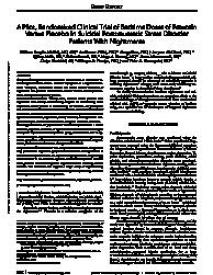A Pilot, Randomized Clinical Trial of Bedtime Doses of Prazosin Versus Placebo in Suicidal Posttraumatic Stress Disorder Patients With Nightmares
Purpose/Background: Observational studies show an association between nightmares and suicide. Prazosin is proposed as a nightmare treatment. This pilot, randomized clinical trial tested whether treatment of nightmares with prazosin would reduce suicidal ideas in suicidal posttraumatic stress disorder (PTSD) patients.
Methods/Procedures: Twenty adult, suicidal PTSD patients with nightmares were blindly and randomly assigned 1:1 to escalating doses of prazosin versus placebo at bedtime only for 8 weeks. All participants had comorbid mood disorders and received stable doses of mood disorder medication. Outcomes of interest were measured weekly and included severity of suicidal ideation, nightmares, PTSD, insomnia, and depression. Longitudinal mixed-effects models assessed change in outcomes over time.
Findings/Results: All psychometric measures improved over 8 weeks. However, nighttime measures of nightmares and insomnia showed significantly less improvement in the prazosin group, whereas there was no significant change in daytime measures of suicidal ideation and daytime-only PTSD symptoms. Two patients required emergency psychiatric hospitalization, but there were no suicide attempts and no deaths.
Implications/Conclusions: This study confirmed an effect of nighttimeonly prazosin on nighttime symptoms of insomnia and nightmares in suicidal PTSD patients who are experiencing nightmares. Surprisingly, the effect was in the direction opposite of what we expected. Furthermore, prazosin showed no signal on daytime measures including suicidal ideation. The results do not support a larger study of nighttime-only prazosin in suicidal PTSD patients but leave open the possibility of benefit from daytime administration of prazosin
Geachte bezoeker,
De informatie die u nu opvraagt, kan door psychotraumanet niet aan u worden getoond. Dit kan verschillende redenen hebben,
waarvan (bescherming van het) auteursrecht de meeste voorkomende is. Wanneer het mogelijk is om u door te verwijzen naar de bron
van deze informatie, dan ziet u hier onder een link naar die plek.
Als er geen link staat, kunt u contact opnemen met de bibliotheek,
die u verder op weg kan helpen.
Met vriendelijke groet,
Het psychotraumanet-team.
In: Journal of Clinical Psychopharmacology, ISSN 0271-0749 ; eISSN 1533-712X | 38 | 6 | December | 618–621
https://journals.lww.com/psychopharmacology/Fulltext/2018/12000/A_Pilot,_Randomized_Clinical_Trial_of_Bedtime.15.aspx
http://doi.org/10.1097/JCP.0000000000000968


